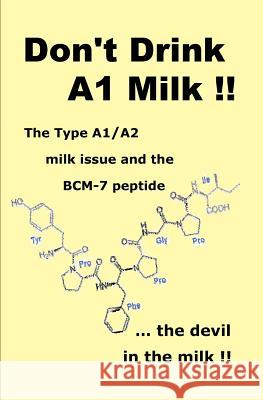Don't Drink A1 Milk !!: The Type A1/A2 milk issue and the BCM-7 peptide ... the devil in the milk » książka
Don't Drink A1 Milk !!: The Type A1/A2 milk issue and the BCM-7 peptide ... the devil in the milk
ISBN-13: 9780979698736 / Angielski / Miękka / 2011 / 174 str.
Don't Drink A1 Milk !!: The Type A1/A2 milk issue and the BCM-7 peptide ... the devil in the milk
ISBN-13: 9780979698736 / Angielski / Miękka / 2011 / 174 str.
(netto: 43,36 VAT: 5%)
Najniższa cena z 30 dni: 42,67 zł
ok. 13-18 dni roboczych.
Darmowa dostawa!
Don't Drink A1 Milk is an expose' of the potential health hazards of drinking Type A1 cow's milk, and the implications for the dairy industry, government, and, most importantly, the consumers. We now know that Type A1 cow's milk genetically differs from the original A2 milk, and can generate the casomorphin peptide, BCM-7 ... the devil in the milk. The BCM-7 molecule can attach itself to the insulin-producing beta cells in the pancreas, prompting an autoimmune destruction of the beta cells, leading to diabetes. It is a strong oxidant, and can oxidize LDL cholesterol, contributing to plague build-up in the arteries. It is also a powerful morphine-like opiate, and can pass through the blood-brain barrier, promoting neurological disorders such as schizophrenia and autism. The evidence is credible and compelling, and cannot be ignored. Our dairy industry has decided not to confront the enormous implications to their status quo, and does not want you to know about this issue. Our various governments and regulatory agencies have chosen to 'bury their heads in the sand', claiming that the BCM-7 hypothesis is not 'proven' and that no risk assessment or protective action is warranted. Dairy farmers in the U.S., Canada, and Europe know little about this issue. Ironically, the dairy farmers in New Zealand, where the research originated, are quietly converting their herds to A2-only producers. Almost all of the milk produced and sold in the U.S. is Type A1 or is contaminated with A1. The author suggests that what is at stake is more than simply a challenge to the dairy industry. Even more important is our health, and that of our children, and of generations to come. And what about the increasing millions who suffer and will suffer from diabetes, heart disease, and neurological disorders? He proposes that it may not be so much a matter of what science finally concludes ... although this is extremely important ... but may be more a matter of consumers knowing the truth, being protected, and having a choice. Yet there is a positive side to this new knowledge ... we may suddenly have at our fingertips a key to eliminating a significant cause of chronic disease and the opportunity to uplift our human health to an even higher level. An urgent call for accountability and action is warranted. Consumers are asked to place their vote in both the political arena and the marketplace to insist on transparency, courage, and integrity on the part of the dairy industry, government, and science to correct this unacceptable dilemma.











